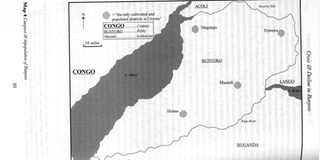How colonialism changed Bunyoro - Part 1

What you need to know:
Dramatic changes. Before the arrival of colonialism, Bunyoro was one of the strongest and richest kingdoms in the region. Omukama Kabalega rejected colonialism and fought a war of resistance but the impact of Bunyoro’s subjugation, both during colonialism and after it, is still being felt today as this first of a two-part article argues.
Bunyoro is a kingdom of contradictions. It forms part of the western Ugandan heartland of the National Resistance Movement, yet few Banyoro are to be found among the upper echelons of the Movement’s leadership.
It falls clearly within the southern half of Uganda, yet its ruling Bito dynasty has strong historic ties with northern societies. It has impressive natural resources, not only East Africa’s largest proven oil reserves, but exceptionally rich forest reserves and major hydroelectric potential – yet the Banyoro are cash poor.
Bunyoro has one of Uganda’s lowest population densities relative to its agricultural capacity, yet in few parts of the country have tensions between locals and immigrants run so high. Not all of these contradictions stem from the colonial period, but the decades of British overrule shaped the direction that Bunyoro would take after independence to a remarkable degree.
For students of African history, Bunyoro is held up as a classic ‘before and after’ example of the negative impact of European imperialism. One of the great powers of pre-colonial Africa, Bunyoro under colonial rule was consigned to the margins of history.
There is a great deal of truth in this perception, but it is an oversimplification. Sure enough, in 1890 Bunyoro was indeed one of the largest states in East Africa, its southern boundary arcing from the Kazinga Channel in the west across to the River Nile near Kamuli in the east.
The kingdom had become the greatest commercial power in the Great Lakes region, exchanging ivory for guns with traders from the East African coast. Bunyoro’s military, the infamous Barusura, had been professionalised, organised into regiments, and had learnt to use firearms more effectively than any of their neighbours. In the 1880s the Barusura contributed to the collapse of the Egyptian Empire, recaptured territories long lost to dissident Bito princes, and inflicted significant defeats on their great rivals, the Baganda.
Shift of power
This shift in power saw trade, tribute, expressions of loyalty, and slaves flowing across Lake Albert, the River Nile and Lake Kyoga towards Bunyoro. Its king, Omukama Kabalega, meanwhile, had deposed members of the royal clan who held major chieftainships and replaced these potential rivals with his generals and members of his mother’s clan, men on whose allegiance he could depend.
But this new regional dominance rested on shaky foundations. For generations Bunyoro had declined from its ancient position of pre-eminence due to Buganda’s aggressive expansionism. Bunyoro’s revival in the 1880s can be accredited to Kabalega’s reforming genius, but his greatest successes occurred during Buganda’s implosion, in the years of martyrdom and civil war.
Buganda’s weakness though was never likely to last forever, and indeed the survivors of Namugongo were almost immediately formed into regiments of riflemen on the Barusura model, and out of the chaos of the religious wars emerged a battle-hardened body of soldiers whose resilience under fire would be crucial during the imperial conquest of Bunyoro.
Bunyoro’s military techniques then could be imitated, and Buganda’s traditional advantage, the ability to put an overwhelming number of men in the field, survived the population losses and disunity of the civil wars. Perhaps had the British Imperial East Africa Company not intervened, Bunyoro might have sustained her pre-eminence by strengthening her alliance with Buganda’s Muslims, and ensuring that internal divisions occupied all of Buganda’s energies. But such a strategy had little certainty of sustained success, and significant risk of military disaster.
In any case British imperialism did choose to side not only with Buganda, but with Buganda’s Christians, making Bunyoro an enemy twice over. European employees of the Egyptian empire and explorers had long demonised Bunyoro for its resistance to Egyptian overrule and obstruction of unauthorised travel along its borders. In the early 1890s, as British soldier-administrators arrived in the region seeking to avenge the killing of General Charles Gordon by the forces of the Mahdi, Bunyoro came to be defined as the major obstacle to the reconquest of the Sudan.
Ironically, given that Bunyoro had become a much more recognisably modern state under Kabalega, and one that had consistently kept the world religions at a safe distance, British officials represented Bunyoro as a bastion of backwardness and radical Islam. Bunyoro was also condemned as a great slaving power, even though Buganda, Britain’s ally, had long dominated the Great Lakes region’s slave economy.
Bunyoro’s previous successes in war and commerce were now being used as a justification for its destruction. And the enemies its armies had created, from the Christian elite in Buganda to Kamurasi, the royal refugee from Tooro, convinced the British that they would have sufficient local allies to effectively occupy the territory that would be removed from Bunyoro in order to ensure its permanent weakening, and to guarantee a route to Lake Albert and so the navigable Nile up to the Sudan.
Once the British government decided to impose a Protectorate over Buganda, its local agents took immediate steps to conquer Bunyoro. Kabalega was offered peace terms – he was required to accept not only British sovereignty but also that Bunyoro should pay tribute to Buganda – that were designed to be rejected. The war that resulted lasted for five and half years, ending only when Kabalega was captured in 1899. By this time Bunyoro had lost two-thirds of its territory, its population had been decimated due to famine, epidemics and emigration, and its livestock and other sources of wealth had been destroyed or appropriated.
Continues tomorrow.




